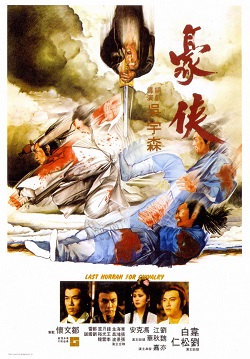Top Qs
Timeline
Chat
Perspective
Last Hurrah for Chivalry
1979 Hong Kong film by John Woo From Wikipedia, the free encyclopedia
Remove ads
Last Hurrah for Chivalry is a 1979 Hong Kong martial arts film written and directed by John Woo, who also produces with Raymond Chow. The film stars Damian Lau and Wei Pai. The film is a precursor to Woo's heroic bloodshed films. The film was released theatrically in Hong Kong on 11 November 1979.
Remove ads
Plot
Summarize
Perspective
Kao, the son and heir of a great deceased warrior, prepares for his wedding at his opulent hillside estate. Kao admits to his men that his bride is a prostitute that he bought for 1000 tang; the men note that Kao has focused on scholarship instead of martial virtue, and suggest that his scholarship has focused on skill in the bedroom. The wedding is interrupted by an attack by Pak, the enemy of Kao’s father. He and his men have come to reclaim the estate that Kao’s father took from him in battle. In the middle of the melee, the bride turns on Kao, and reveals that Pak paid her 2000 tang to betray Kao. As a result, the battle goes poorly and Kao is forced to flee with his last remaining servant, leaving control of the estate to Pak.
Kao swears revenge, but his servant convinces him he will need help. Kao first asks a grandmaster for a magic sword to aid in his revenge, but the grandmaster denies the request, saying Kao's character is lacking. Next Kao seeks for a warrior who he can hire to defeat Pak for him, and finds Chang, who has mostly given up combat to care for his sister and their ailing mother. Kao charms Chang into helping him, by buying expensive medicines for his mother, and later by paying her funeral expenses.
Chang climbs the wall of a courtyard to enjoy the music performed by the courtesan Sau Sau. There he meets Tsing, a drunken wandering mercenary, who is in a one-sided relationship with the courtesan. The two join forces and develop a bond of brotherhood. They scout the estate of Pak to identify his most dangerous henchmen, and then launch their attack, defeating the henchmen in turn and finally defeating Pak. After their victory, Tsing puts his sword to Chang’s throat and tells him Kao offered 500 tang to kill him. Later, Kao’s family servant sees Chang’s lifeless body.
Kao ransacks the grandmaster’s home for the magic sword and finds it hidden behind a mirror. He kills the grandmaster, then lies to his servant that the grandmaster’s death was suicide. The servant confronts Kao for his poor character, and Kao kills him as well.
Tsing comes to collect the price from Kao, and Kao gives him a bag. Tsing suspects a trap, and discards the bag, which is filled with venomous snakes. Chang emerges from hiding, and the three do battle. The magic sword allows Kao to fly into the sky and disappear, and then unleash a devastating falling attack. The third time Kao tries this attack, Tsing pushes Chang aside and lifts his sword to the sky. Kao and Tsing simultaneously impale each other, leaving Chang the only survivor.
Remove ads
Cast
- Damian Lau as Tsing Yi
- Wai Pak as Chang San / Cheung Sam
- Bonnie Ngai as Sau Sau (The courtesan)
- Lau Kong as Kao Pang / Ko Peng
- Lee Hoi-sang as Pak Chung Tong
- Fung Hak-on as Pray / Let It Be
- Chin Yuet-sang as Sleeping Wizard
- Hsu Hsia as Party Guest (Cameo)
- Cheng Lui as Chen Guan Wu
- Wang Kuang-yu as Wang
- Chui Chung-san as oriental fighter / bodyguard
- Mars as Pak Chung Tong's man
- Tai San as Pak Chung Tong's man
- Huang Ha as Pak Chung Tong's man
- Wong Chi Ming as Part Guest
- Benny Lai as San's Drinking Partner
- To Wai Wo as Casino Thug (Extra)
- Lee Hang as Casino Thug (Extra)
Remove ads
Production
The film is a tribute to director John Woo's mentor, Chang Cheh. The stylish appeal also came from Akira Kurosawa influences. The main character Tsing Yi is an inspiration taken from the real-life assassin Jing Ke, who is historically remembered for his failed assassination attempt of Qin Shi Huang. The year the film was released is also the same year John Woo met Tsui Hark.[1]
The film was veteran Shaw Brothers actor Wei Pai's first Golden Harvest production, since his departure from Venom Mob group and the company.
In addition, Woo's frequent collaborator from the 70s Fung Hak-on (who also has a main role in the film) served as a stunt co-ordinator, along with assistance of Alan Chui Chung-San in the choreography and stunt doubling department for Damian Lau and Wei Pai. Both choreographers also previously starred in Woo's feature length debut film, The Young Dragons in 1974.
Box office
Last Hurrah for Chivalry had mediocre box office numbers.[1]
Media Release
The film was officially released on 2K Blu-ray on March 3rd, 2023 as part of a The Criterion Collection spine number 1174, marking Woo's third film to be released by Criterion since 1998 with Woo's two other popular films such as The Killer (1989 film) and Hard Boiled, both of which were released in DVD and Laserdisc format in limited production run due to the rights issue at the time.
References
External links
Wikiwand - on
Seamless Wikipedia browsing. On steroids.
Remove ads

